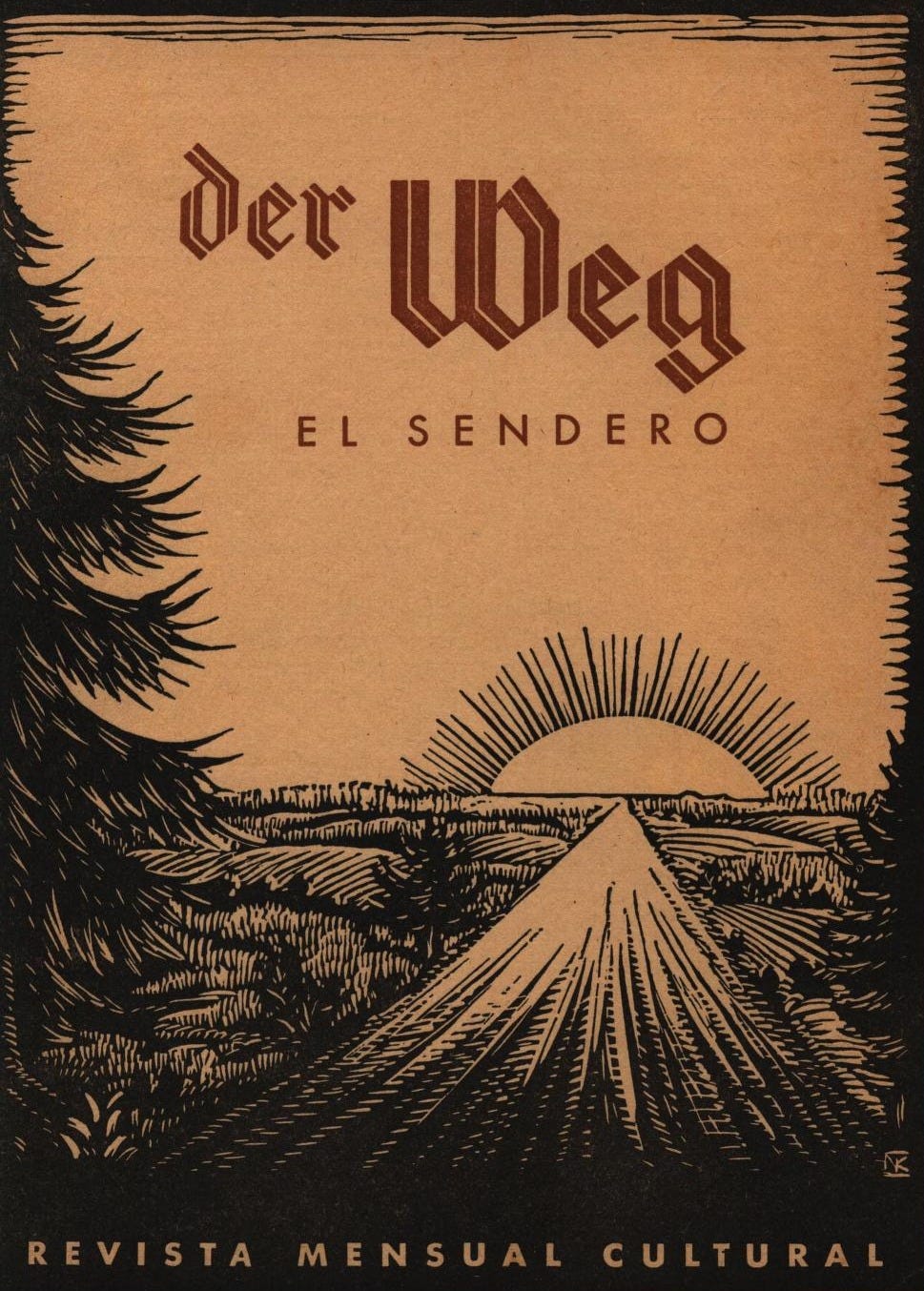[1947-1948] Der Weg Opening Poems
Poems from Year One and Two of "Der Weg / El Sendero / The Path"
Title: Multiple, see each entry.
Author(s): Multiple, see each entry.
“Der Weg” Issue: Multiple (All 1947 & 1948).
Page(s): Multiple
Available in audio at:
Year One, Issue 4: September 1947
Gorch Fock
Wir gehen hellen Blickes in den Herbst und den klaren Winter hinein mit dem Gedanken: nicht daß die Stürme an unserm Haus vorbeigehen mögen, sondern daß wir sie bestehen.
With eyes alight, we step into autumn and the crisp winter, holding this resolve: not that storms might pass by our house, but that we shall endure them.
Year One, Issue 5: October 1947
Johann Wolfgang von Goethe
Manchmal sieht unser Schicksal aus wie ein Fruchtbaum im Winter. Wer sollte bei dem traurigen Ansehen desselben wohl denken, dass diese starren Äste, diese zackigen Zweige im nächsten Frühjahr wieder grünen, blühen, sodann Früchte tragen könnten?
At times, our fate resembles a fruit tree in winter. Who, beholding its sorrowful aspect, could imagine that these rigid branches, these gnarled twigs, might once again grow verdant, blossom, and ultimately bear fruit when spring returns?
Year One, Issue 6: November 1947
Old German Helm-Maxim [de: Altdeutscher Helmspruch]
Wenn sie mir gleich die Eissenhawben vomm Haupte werffen unt mein stähelin Krebs in stuckh schlagen, unt wenn sie mir das schwerdt zerbrechen, hernach nehm ich Dich, Herr Gott, zum schildt unt kempf nackendt unt werdt obsiegen.
Even should they wrench the iron helm from my head and shatter my steel armor into shards, even should they splinter my sword to ruin—then will I take You, O Lord God, as my shield, and fight stripped bare, and triumph.
Year Two, Issue 1: January 1948
Path [de: Weg]
by Josef Weinheber
Nein, wir sterben nicht: Wieder, immer wieder weckt uns das Graun. Wir verstummen nicht: Lieder erpresst der allmächtige Schmerz. Wir erblinden nicht: Nacht müssen wir lebenlang schaun. Wir ertauben nicht: Hörner letzten Gerichts mit Macht tönen, toben in unser Ohr. Wir erkranken nicht: Herz wird mit Erde bedeckt und heilt — Nein, wir sterben nicht: Ferner Wille reisst uns empor weiterzugehn - unverweilt wie immer zuvor.
No, we do not die: time and again, horror jolts us awake. We do not fall silent: from the depths of almighty pain, songs are wrenched free. We do not go blind: we are destined to stare into the night for a lifetime. We do not go deaf: the horns of the final judgment blare and roar with fierce power into our ears. We do not sicken: our hearts, blanketed by earth, find healing. No, we do not die: a distant will rips us upward, urging us to press on—without hesitation, as we always have before.
Year Two, Issue 2: February 1948
Warning [de: Mahnung]
by Addo Schwarzenberg
Bleibt hart in dieser bösen zeit, bleibt hart wie felsenstein, auch wenn die Flut voll zorn und Neid euch einsam spült und rein! Die Flut verrauscht, ihr dauert an, bis wieder Sonne scheint, bis neue Erde fruchtbar dann sich sammelnd um euch eint.
In these trying times, stay resolute, as unshakeable as a boulder against the storm. Even when the torrent, seething with rage and jealousy, engulfs you, leaving you solitary yet scoured clean, hold fast. The waters will ebb, and you will remain, steadfast until the sun’s return. Then, a renewed earth, teeming with life, will coalesce around you, finding unity in your enduring presence.
Year Two, Issue 10: October 1948
Hyperion to Bellarmin [LX]
by Friedrich Hölderlin
Ich hatt' es nie so ganz erfahren, jenes alte, feste Schichsalswort, daß eine neue Seligkeit dem Herzen aufgeht, wenn es aushält und die Mitternacht des Grams durchduldet, und daß, wie Nachtigallgesang im Dunkeln, göttlich erst in tiefem Leid das Lebenslied der Welt uns tönt.
I’d never so fully felt the old and firm and fateful saying that for the heart a new bliss rises when it holds out and endures through the midnight of grief, and that, like nightingale’s singing in darkness, it’s in deep suffering that first divinely sounds for us the lifesong of the world.
Year Two, Issue 11: November 1948
Johann Wolfgang von Goethe
Wir bekennen uns zu dem Geschlecht das aus dem Dunkeln in das Helle strebt.
In a world often shrouded in uncertainty, we proudly declare our kinship with those who strive from the shadows of ignorance and despair into the luminous realms of knowledge and hope.
Year Two, Issue 12: December 1948
Advent Song [de: Adventlied]
by J. M. Vehner
Gottes Weiser Gehen leiser Auf der kahlen Flur. Licht verhüllt sich, Sinn erfüllt sich, Ahnst die Strahlen nur. Bald im Leibe Kommt vom Weibe Rosenschön das Kind. Hoch zu loben, Hör sie proben, Harfen schön im Wind. Laß es schneien: Wie im Maien Blühn die Flocken lind. Wie sie sich freuen, Herzen erneuen, Alle, die vom Himmel sind.
God’s sages move with hushed steps over the desolate plain. Light drapes itself in mystery, while purpose finds its fulfillment, leaving only the whisper of rays to be felt. Ere long, from the mother’s embrace, comes forth the child, radiant as a rose in bloom. Lift your voices in exultation; hear the celestial choir in rehearsal, their harps weaving beauty through the wind. Let the snow descend: as in the springtime, the flakes unfurl with gentle grace. Behold their joy, hearts reborn, all who descend from the celestial realm.



![[1947-1948] Der Weg Opening Poems](https://substackcdn.com/image/fetch/$s_!gjaA!,w_140,h_140,c_fill,f_auto,q_auto:good,fl_progressive:steep,g_auto/https%3A%2F%2Fsubstack-post-media.s3.amazonaws.com%2Fpublic%2Fimages%2Fa484b54b-1281-4680-9f80-b089808f23fc_1400x1400.png)